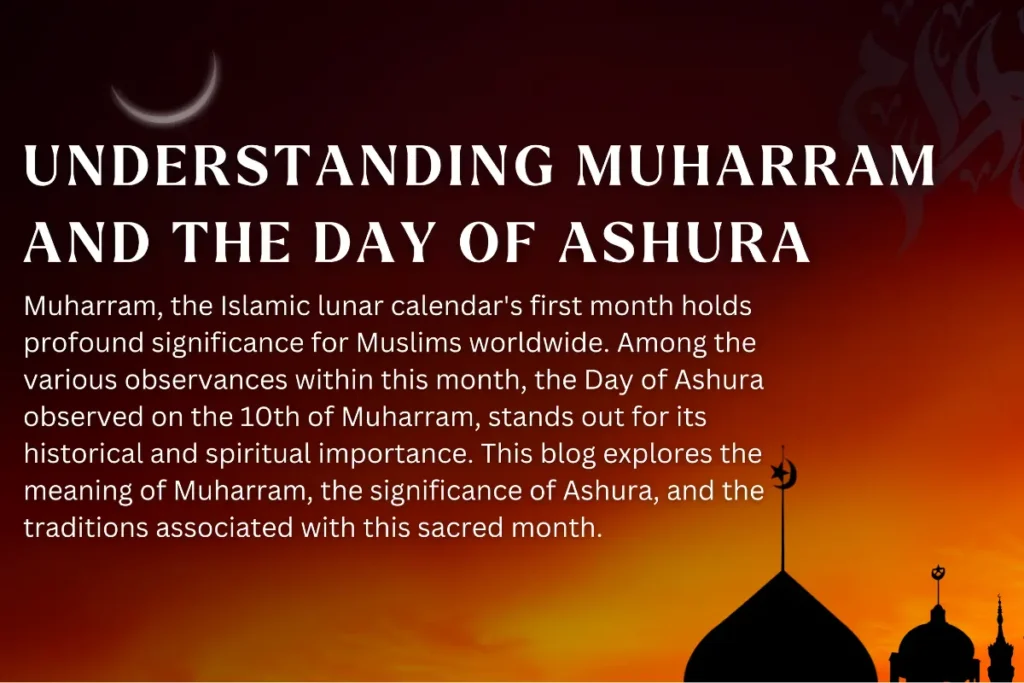Muharram, the first month of the Islamic lunar calendar, holds profound significance for Muslims around the world. Among the various observances within this month, the Day of Ashura, observed on the 10th of Muharram, stands out for its historical and spiritual importance. This blog explores the meaning of Muharram, the significance of Ashura, and the traditions associated with this sacred month.
The Meaning of Muharram
The word “Muharram” translates to “forbidden,” indicating its status as one of the four sacred months in Islam during which warfare is prohibited. This month marks the beginning of the Islamic New Year and is a time for reflection, repentance, and renewal of faith. The sanctity of Muharram is deeply rooted in Islamic tradition, with its observance dating back to the time of Prophet Muhammad (peace be upon him).
The Day of Ashura
Ashura, derived from the Arabic word for “ten,” falls on the 10th day of Muharram. Ashura meaning is a day of fasting and spiritual reflection. The Prophet Muhammad (peace be upon him) established the practice of fasting on this day to commemorate the deliverance of Prophet Musa (Moses) and the Israelites from Pharaoh’s oppression.
This event underscores the themes of faith, perseverance, and divine intervention.
Fasting on the day of Ashura is highly meritorious, as it expiates the sins of the previous year. In addition to fasting, Muslims engage in additional prayers, Quranic recitations, and acts of charity to seek Allah’s mercy and blessings.
The Tragedy of Karbala
Ashura holds significance for all Muslims due to the tragic events of the Battle of Karbala. In 680 AD, Imam Hussain (RA), the grandson of Prophet Muhammad (peace be upon him), and his followers were martyred by the forces of Yazid, the Umayyad caliph. This event is a symbol of resistance against tyranny and a profound reminder of the sacrifices made for justice and truth.

Spiritual Practices and Reflections
Muharram is a time for increased devotion and spiritual growth. Muslims engage in various practices to deepen their connection with Allah and seek His forgiveness. Here are some key practices observed during Muharram:
Muharram Fasting
Fasting is a central practice during Muharram, especially on the 9th and 10th days (Tasua and Ashura). The Prophet Muhammad (peace be upon him) encouraged fasting on the 9th and 10th of Muharram to follow the example of Prophet Musa (AS).
The encouragement to fast on the 9th and 10th of Muharram is supported by various Hadiths. One notable Hadith is:
“The Messenger of Allah (peace be upon him) said: ‘The best of fasting after Ramadan is fasting Allah’s month of Muharram.“
(Sahih Muslim)
The Prophet Muhammad (peace be upon him) also expressed his intention to fast on the 9th of Muharram to distinguish the Muslim practice from that of the Jews:
“When the Prophet (peace be upon him) fasted on the Day of Ashura and ordered that it be observed as a fast, his companions said to him: ‘Messenger of Allah, it is a day which the Jews and Christians hold in high esteem.’ Thereupon, the Messenger of Allah (peace be upon him) said: ‘When the next year comes, Allah willing, we shall fast on the 9th.’ But the Messenger of Allah (peace be upon him) passed away before the next year came.“
(Sahih Muslim)
Prayers and Duas
In addition to the obligatory prayers, Muslims perform extra prayers (nafl) and recite specific supplications (duas) during Muharram. These include seeking Allah’s protection, guidance, and blessings. Common duas for this month ask for health, relief from hardship, and spiritual upliftment.
Quranic Recitations
Reading the Quran is an essential part of worship in Muharram. Muslims recite various chapters, including Surah Al-Fajr and Surah Al-Ikhlas, reflecting on their meanings and seeking to draw closer to Allah.
Charity and Good Deeds
Acts of charity are highly encouraged during Muharram. Giving to those in need, helping the less fortunate, and engaging in community service are ways to earn Allah’s favor and emulate the compassion of the Prophet Muhammad (peace be upon him). Be sure to avoid believing and spreading myths, such as can you do nikah in Muharram or not?
Reflecting on Historical Events
Muharram is also a time to reflect on significant historical events. Key dates include:
1st Muharram:
The start of the Islamic New Year, a time for setting new intentions and resolutions.
2nd Muharram:
The arrival of Imam Hussain (RA) and his followers in Karbala.
3rd-9th Muharram:
The period leading up to the Battle of Karbala, was marked by increased tension and hardship.
10th Muharram (Ashura):
The day of the battle and the martyrdom of Imam Hussain (RA).
These reflections serve as a reminder of the resilience and faith of early Muslims and the lessons we can draw from their experiences.
Conclusion
Muharram and the Day of Ashura offer Muslims an opportunity for deep spiritual reflection, fasting, and acts of devotion. This month is a time to honor historical events, seek forgiveness, and renew their commitment to faith. By engaging in fasting, prayers, and good deeds, Muslims worldwide strive to attain spiritual growth and Allah’s mercy during this sacred month.










